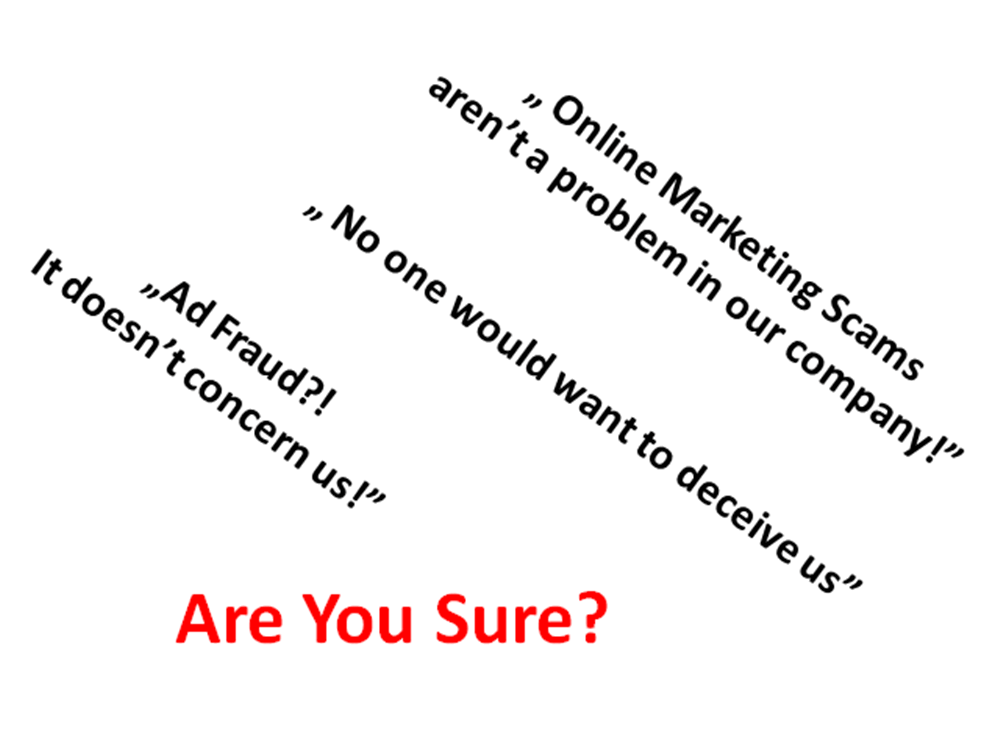"Ad Fraud?! It doesn’t concern us! ”- are you sure?

source: own elaboration
As an online fraud protection company at TrafficWatchdog, we often hear from advertisers that the problem of advertising fraud doesn’t apply to their company. Even more terrifying is the fact that many entrepreneurs actually believe it. When asked why they think so, they answer that they spend too little money on advertising on the Internet to become valuable targets for this type of fraud. Such an approach is common, but it doesn’t change the fact that it is completely detached from reality.
First, automation tempts fraudsters
Companies with small advertising budgets are often users of automated marketing solutions (such as extremely popular Google Ads) - which are easy targets for fraudsters. When they find a gap in the operation of a given tool they can trick all advertisers using a given solution. Of course, we should also remember that not all fraudsters are publishers - some of them may act on behalf of the competition. Even if the entrepreneur doesn’t pay for outsourced traffic, his competitor may pay someone to click spam on his ads. Such action may not only generate huge costs, especially in case of small marketing budgets, but even destroy the entire marketing campaign.
'Cheap' billing models also foster fraud
Advertisers who saved in affiliate activities have themselves led to a situation where ad fraud fraudsters could spread their wings. They wanted to receive the best possible ranges for their campaigns, offering their publishers not very favorable rates. By choosing billing models such as CPC (cost per click, i.e. remuneration awarded per click), CPL (cost per lead, the rate set for a completed contact form or potential customer data) or CPM (cost per mile, where settlement takes place for 1000 impressions advertisements), we must take into account that the publishers promoting us will want to artificially "inflate" the results by providing us with false leads, generating false clicks or displaying our ads in an automated manner. These are the so-called attribution scams, and their varieties are as many as fraudulent publishers. Affiliate campaigns are among the most vulnerable to fraud, and campaigns in which publishers only need to generate traffic to a given website or display a given ad are particularly high risk.
Cheating is not that difficult!
Many entrepreneurs assume that fraudsters dealing with similar scams must be extremely intelligent, have the latest equipment or invest significant financial resources in the frauds carried out. Hence, they think their companies won’t be "worthwhile" to attack. In practice, however, cheating in online marketing isn’t that difficult! First of all, there are many ways to deceive the advertiser. Some of them may actually require knowledge or technological facilities, but many of them can be carried out in the privacy of your home. First of all, let's remember that if a fraudster develops a method, or even a program, to facilitate fraud - he will try to use it not on one, but many advertisers. False publishers aren’t Robin Hoods they don't care whether they steal from the rich or the poor, and smaller companies can be a much easier target for them.
Why aren’t we hearing about ad frauds in smaller companies? Because their detectability there is very low!
Just because the most high-profile online marketing fraud cases involve large companies, it doesn't mean that they don't occur in smaller businesses. On the contrary - small companies, as well as large ones, are certainly victims of fraudulent publishers and other online scammers, but in them the detection of such behavior is much lower, if only because of the negligible security and not so extensive scale of the phenomenon. Enterprises that use online marketing on small-scale are much less likely to invest in security systems, they don't employ professional analysts, and they don't usually use sophisticated programs that can be useful in detecting similar scams. However, specialists agree - the problem of fraud in online marketing is common and concerns both small and medium-sized companies as well as international giants.
There is more and more talk about fraud in online marketing, statistics on false manifestations of user activity and wasted advertising budgets are growing every year, and there is no indication that anything will change in this area. According to ABTShield, from 17 to 26 percent of all advertising expenses can be classified as frauds, and as we read on the website fraudbusters.pl - Between 800 million PLN and 1.2 billion PLN: such money falls prey to ad fraudsters in Poland every year. This is the amount absorbed by a wide advertising ecosystem for services that have never reached any live audience. These statistics cover the entire market, so no company that uses the internet to acquire customers should ignore this problem! To learn more about the dangers of online marketing fraud and protection against them - contact us using the contact form.

